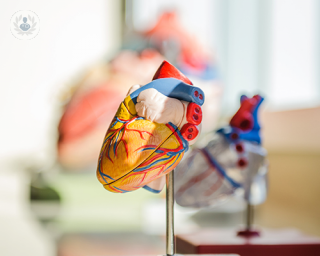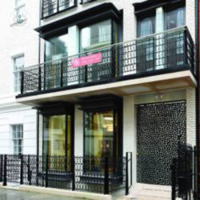What is mitral valve regurgitation?
Mitral regurgitation is the most common heart valve disorder. It occurs when the heart valve does not close properly meaning that there is a backflow of blood from the left ventricle to the left atrium. The leakage of blood backward through the mitral valve occurs every time that the left ventricle contracts.

What are the symptoms of mitral regurgitation?
For some people, there are no signs of mitral regurgitation or the symptoms develop gradually over time and may even take years to appear. These may include:
- fatigue
- abnormal heart murmur, which is heard through a stethoscope
- dizziness
- heart palpitations, such as fast heart rate sensations
- difficulty breathing, especially after physical activity or when lying down
- swollen feet or ankles
In some cases, the symptoms appear suddenly due to a heart attack or a rupture of the valve cords.
What are the causes of mitral valve regurgitation?
The heart has four valves – the mitral, tricuspid, pulmonary and aortic valves - that keep the blood flowing in the right direction. Each of the valves has flaps that open and close during each heartbeat.
Sometimes the valves do not open or close properly, which disrupts the blood flow through the heart to the body. With a mitral valve regurgitation, the valve between the left chamber and the lower left chamber does not close fully, which causes blood to leak backwards into the left atrium. It is caused by problems that occur in the mitral valve, which are known as primary mitral valve regurgitation. Possible causes are:
- coronary heart disease
- arterial hypertension
- displacement of the mitral valve
- heart attack
- rare diseases such as Marfan syndrome (a genetic disorder of the connective tissue)
- rheumatic heart disease
- swelling of the heart
How is mitral regurgitation prevented?
Implementing lifestyle changes such as eating healthily (fruits, vegetables, wholegrain and organic meat and fish) can help overall wellbeing. High blood pressure can make mitral regurgitation worse, so blood pressure lowering medicines may help. Limiting salt intake is recommended for those who have hypertension. The reduction of caffeine and alcohol lowers the risk of arrhythmias.
What is the treatment for mitral regurgitation?
There may be regular examinations and monitoring of mitral valve regurgitation but treatment depends on the severity of the individual case. If it is mild or moderate, then medical treatment may not be needed but the doctor will watch the condition regularly.
In more severe cases, mitral regurgitation surgery is required to repair the mitral valve. Sometimes a patient may need a replacement valve, which is made of pig, cow or human heart tissue. There are also man-made mechanical valves as an option.
Mitral regurgitation
Dr Rasha Al-Lamee - Cardiology
Created on: 09-03-2015
Updated on: 10-11-2023
Edited by: Sophie Kennedy
What is mitral valve regurgitation?
Mitral regurgitation is the most common heart valve disorder. It occurs when the heart valve does not close properly meaning that there is a backflow of blood from the left ventricle to the left atrium. The leakage of blood backward through the mitral valve occurs every time that the left ventricle contracts.

What are the symptoms of mitral regurgitation?
For some people, there are no signs of mitral regurgitation or the symptoms develop gradually over time and may even take years to appear. These may include:
- fatigue
- abnormal heart murmur, which is heard through a stethoscope
- dizziness
- heart palpitations, such as fast heart rate sensations
- difficulty breathing, especially after physical activity or when lying down
- swollen feet or ankles
In some cases, the symptoms appear suddenly due to a heart attack or a rupture of the valve cords.
What are the causes of mitral valve regurgitation?
The heart has four valves – the mitral, tricuspid, pulmonary and aortic valves - that keep the blood flowing in the right direction. Each of the valves has flaps that open and close during each heartbeat.
Sometimes the valves do not open or close properly, which disrupts the blood flow through the heart to the body. With a mitral valve regurgitation, the valve between the left chamber and the lower left chamber does not close fully, which causes blood to leak backwards into the left atrium. It is caused by problems that occur in the mitral valve, which are known as primary mitral valve regurgitation. Possible causes are:
- coronary heart disease
- arterial hypertension
- displacement of the mitral valve
- heart attack
- rare diseases such as Marfan syndrome (a genetic disorder of the connective tissue)
- rheumatic heart disease
- swelling of the heart
How is mitral regurgitation prevented?
Implementing lifestyle changes such as eating healthily (fruits, vegetables, wholegrain and organic meat and fish) can help overall wellbeing. High blood pressure can make mitral regurgitation worse, so blood pressure lowering medicines may help. Limiting salt intake is recommended for those who have hypertension. The reduction of caffeine and alcohol lowers the risk of arrhythmias.
What is the treatment for mitral regurgitation?
There may be regular examinations and monitoring of mitral valve regurgitation but treatment depends on the severity of the individual case. If it is mild or moderate, then medical treatment may not be needed but the doctor will watch the condition regularly.
In more severe cases, mitral regurgitation surgery is required to repair the mitral valve. Sometimes a patient may need a replacement valve, which is made of pig, cow or human heart tissue. There are also man-made mechanical valves as an option.


Mitral valve regurgitation: what exactly is it?
By Mr Inderpaul Birdi
2025-01-20
Mitral regurgitation is when the heart’s mitral valve doesn't close well enough during contractions, causing blood to leak and flow back into the heart. Blood is then incorrectly sent back towards the left atrium, causing various problems. Mr Inderpaul Birdi, a leading cardiothoracic surgeon in London, explains this condition and how it can be treated. See more


mTeer – A new treatment for mitral regurgitation
By Professor Michael Mahmoudi
2025-01-20
Mitral regurgitation is the most common type of heart valve disease, caused by the valve joining the left heart chambers not closing completely. In his latest article, renowned cardiologist Professor Michael Mahmoudi explains this condition in detail, and explains the mTEER treatment method. See more


The future of robots in heart surgery
By Mr Paul Modi
2025-01-18
As technology develops, so do surgical techniques. Robots in heart surgery provide promising improvements to patients' procedures. Robotic surgery is one of Mr Paul Modi's specialities and he explains the exciting future of these medical advancements and the benefits they provide to patients. See more


What does the future of robotic-assisted heart surgery hold?
By Mr Paul Modi
2025-01-13
Medical technology is constantly evolving, including the use of assisted robots for life-changing procedures such as heart surgery. Here, Mr Paul Modi the only robotic mitral valve surgeon in the UK explains what the future of surgery looks like. See more
Experts in Mitral regurgitation
-
Mr Ulrich Rosendahl
Cardiothoracic surgeryExpert in:
- Aortic valve replacement
- Transcatheter aortic valve implantation (TAVR)
- Mitral regurgitation
- Minimally invasive cardiac surgery
- Heart valve surgery
- Cardiovascular disease
-
Dr Michael Mullen
CardiologyExpert in:
- Valvular heart disease
- TAVI (transcatheter aortic valve implantation)
- Patent foramen ovale
- Mitraclip
- Atrial septal defect
- Mitral regurgitation
-
Mr Vivek Srivastava
Cardiothoracic surgeryExpert in:
- Aortic valve replacement
- Coronary bypass surgery
- Heart valve surgery
- Mitral regurgitation
- Mitral valve repair
- Cardiovascular disease
-
Professor Sagar Doshi
CardiologyExpert in:
- TAVI (transcatheter aortic valve implantation)
- Mitral regurgitation
- Heart valve surgery
- Echocardiogram
- Transoesophageal echocardiogram
- Ambulatory blood pressure monitoring
-
Dr Ee Ling Heng
CardiologyExpert in:
- Congenital heart disease
- Atrial septal defect
- Cardiac MRI
- Interventional cardiology and congenital structural pathology
- Valvular heart disease
- Mitral regurgitation
- See all

The Harborne Hospital - part of HCA Healthcare
The Harborne Hospital - part of HCA Healthcare
Mindelsohn Way, B15 2FQ
No existe teléfono en el centro.
By using the telephone number provided by TOP DOCTORS, you automatically agree to let us use your phone number for statistical and commercial purposes. For further information, read our Privacy Policy
Top Doctors

77 Wimpole Street
77 Wimpole Street
77 Wimpole Street, London. W1G 9RU
No existe teléfono en el centro.
By using the telephone number provided by TOP DOCTORS, you automatically agree to let us use your phone number for statistical and commercial purposes. For further information, read our Privacy Policy
Top Doctors
-
The Harborne Hospital - part of HCA Healthcare
Mindelsohn Way, B15 2FQ, BirminghamExpert in:
- Digestive
- Cancer
- Orthopaedic surgery
- Thoracic Surgery
- Diagnostic Imaging
- Obstetrics and Gynaecology
-
77 Wimpole Street
77 Wimpole Street, London. W1G 9RU, W1G Marylebone LondonExpert in:
- Homecare
- Cardiology
- Preventive cardiology
- Cardiovascular disease
- Respiratory diseases
- Hypertension
- Most viewed diseases, medical tests, and treatments
- Narcolepsy
- Snoring
- Polysomnography (sleep study)
- Alzheimer's disease
- Chronic headache
- Electrophysiology study
- Autoimmune diseases
- Joint pain
- Nutrition
- Genetic testing







